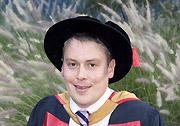Winning in the material world
The US Navy and a London finance house have been tapping the skills of a UNSW science graduate who has just won a major award.
The US Navy and a London finance house have been tapping the skills of a UNSW science graduate who has just won a major award.

The US Navy and a London finance house have been tapping the skills of a UNSW science graduate who has just won a major award.
"Absolutely fantastic!" were the words Dr Matthew Tilbrook used to describe how he felt upon hearing that he'd won the 2007 UNSW U Committee Award for Research Excellence in Science. The just-announced award of $10,000 is given annually to a doctoral student in the Faculty of Science judged to have submitted the best PhD thesis within a calendar year.
Matthew's dissertation described his investigation of novel graded-composite materials and their abilities to withstand repeated stresses and strains over thousands, and even millions, of cycles. Composites are engineering materials made from two or more constituent materials. Their appeal is that the combination of certain materials imparts synergistic properties that can't be obtained from individual constituent materials.
Composites such as building bricks made from straw and mud have been in use for thousands of years. Today, there are countless composite materials used in industrial, consumer and medical settings. Examples include fibreglass, bitumen, steel-reinforced concrete, nylon, polyethylene, and metal alloys such as stainless steel. Graded composites offer further improvements in performance in applications ranging from power-station turbine blades to artificial bone implants.
Matthew recently accepted a position with a project finance consultancy in London following a post-doctoral position at Cambridge University's Centre for Micromechanics. His research at Cambridge focused on computational and theoretical investigations of deformation and failure mechanisms in metal sandwich panels with low-density lattice cores.
"At Cambridge we worked with a number of collaborators, including the US Navy. They are interested in developing techniques to make their ship hulls stronger and more resilient to impacts and shock waves. We did a range of experiments, computer simulations and analytical modelling that suggested that in 50 years' time, an aircraft carrier will still be made from steel but it will probably have a more complicated multi-hull structure".
"I really enjoyed doing my PhD here at UNSW," Matthew said, during a flying visit from London to accept the award. "I chose to do a PhD in materials science because it gave me the chance to blend pure science with real-world engineering applications. I enjoyed the challenge of a project that I could make my own. That said, I had really excellent support from my supervisor, Associate Professor Mark Hoffman in the School of Materials Science and Engineering."
Matthew's longer-term aspirations are in energy finance, specifically in the initiation and development of large-scale renewable and reduced emission-energy projects. "There are serious challenges facing the world today - climate change is just one example. Scientists have keys roles in identifying and understanding these issues, and most importantly in addressing them."